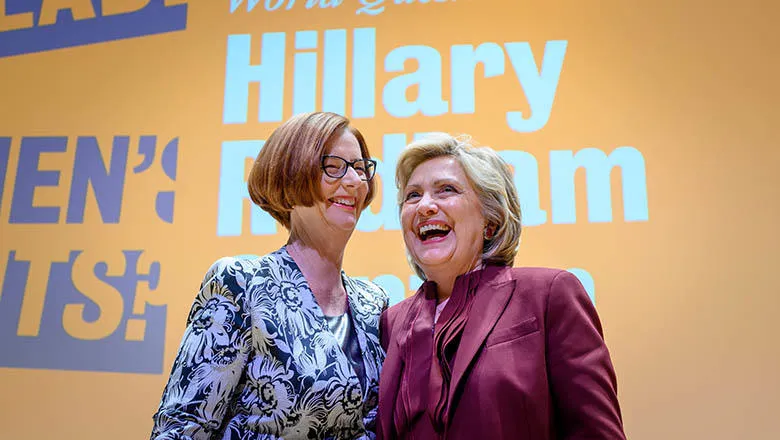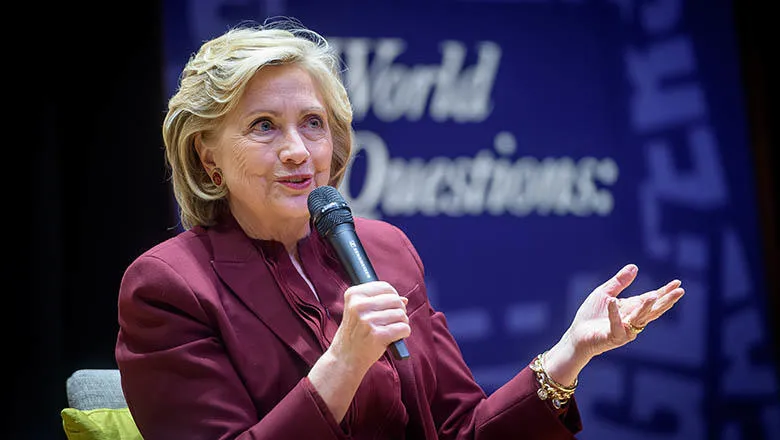19 November 2019
Hillary Clinton and Julia Gillard launch World Questions event series
Hillary Rodham Clinton came to King’s College London last week for an event in conversation with former Australian Prime Minister Julia Gillard.

Hillary Rodham Clinton, former US Secretary of State and the first female presidential candidate of a major US political party, came to King’s College London last week for an event in conversation with former Australian Prime Minister Julia Gillard.
Organised by the Global Institute for Women’s Leadership and the Policy Institute, the event was the first in a new King’s series called World Questions, which aims to promote new perspectives, insights and solutions from global leaders with first-hand experience of making change. The discussion between Secretary Clinton and Julia Gillard centred on barriers to women’s leadership, the increasingly toxic culture for women in politics and The Book of Gutsy Women, Clinton’s new book written with her daughter, Chelsea.
Gillard kicked off the discussion, taking us back 25 years to the then First Lady’s speech in Beijing, where she famously said: “Human rights are women’s rights, and women’s rights are human rights”. While both leaders acknowledged that much progress had since been made on political and legal rights, Clinton stressed the multiple barriers still faced by women in the workplace and at home:
“We still are struggling with continuing attitudes about what’s appropriate or not for women and what people think about women’s lives or women’s roles…these deeply embedded attitudes…are then then internalised by girls and women, which often act as artificial barriers for…women’s aspirations and larger society’s expectations.”

Given the misogyny both women leaders faced throughout their time in politics, the discussion turned to the upcoming UK general election and concerns about the number of female MPs stepping down at the height of their careers because of the abuse and threats directed towards them and their families. Secretary Clinton said:
“When I heard about all these people, particularly the women, who weren’t going to run again, and they attributed it to the threats they are going to face, that is not only a threat to individuals, that is a threat to democracies…If people are intimidated out of running for office in a democracy because of these hatemongers…that is the path to authoritarianism, that is the path to fascism.”
The discussion was supported by new research by the Global Institute for Women’s Leadership, Policy Institute and Ipsos MORI which looks at what helps or hinders women’s equality around the world. The survey found that the British public think that men are less likely than women to need intelligence and hard work to get ahead in life. Citing the research, Gillard jokingly asked Clinton: “Can you think of a time when a super-smart woman perhaps lost out to a man who was less intelligent?”
The research also revealed that one in 10 Britons think a woman’s looks are a key factor in helping them get ahead, compared with just 4% who say the same for men. Secretary Clinton said: “It’s these stereotypes about what a woman is expected to look like that are the problem…men are allowed to come in all shapes and sizes, all forms of dress, all kinds of presentation.”
Now three years on from the 2016 US election, Gillard asked Clinton how, as a “gutsy woman”, she got through the defeat. Clinton said that although she was “shocked” and “devastated”, it was never primarily just about her:
“I was particularly feeling the burden of having disappointed so many women and little girls…so I addressed all the little girls out there telling them not to give up on their dreams.”
The discussion ended with a look at Secretary Clinton’s new book, a collection of her and her daughter’s favourite stories of women’s courage and resilience. Clinton said:
“There are a lot of women in this book who...had to find an enormous amount of courage and resilience to keep going…they wanted to make a positive difference in other people’s lives and I think we can all use a big dose of that right now.”
